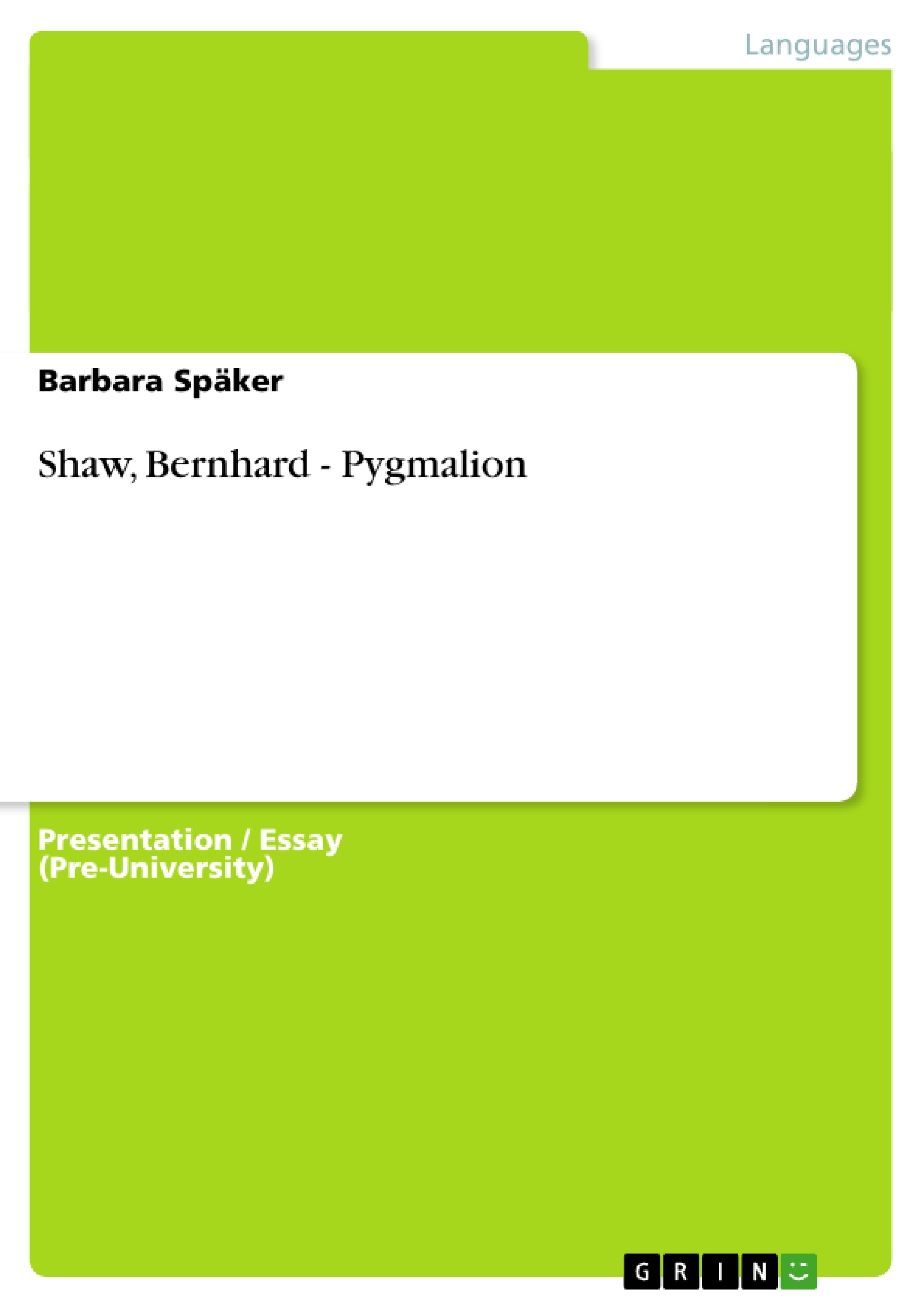Pygmalion
Author: Bernard Shaw
- born on July 2nd, 1856 in Dublin
- 1925: received the Nobel prize for “Saint Joan”
- important works: “Mr Warren’s profession” “Pygmalion” (1st performance 1913 in Vienna in German)
- he died on November 2nd, 1950 in England
Preface
a) he wants to explain why he wrote such a drama
b) he wants to explain his allusions / his intention / his message
c) he wants to inform his readers, the actors and directors of the play
- prefaces were read as much as the plays themselves
Shaw likes to be a “agent provocateur”
- English people can’t spell their own words, the spelling system is ineffective
- He criticises the English severely
Abbildung in dieser Leseprobe nicht enthalten
Act 1
Abbildung in dieser Leseprobe nicht enthalten
Character constellation
Abbildung in dieser Leseprobe nicht enthalten
Cockney English: speech of someone born within the Bow Bells (bells of Saint-Mary-le Bow)
- near St. Paul’s cathedral
- East End: working class London
Accent: particular feature of person’s pronunciation
Dialect: variety of a language with particular vocabulary and grammar > urban areas
RP: social accent with comparatively little regional variation; spoken by educated upper class Slang: non-standard vocabulary, extremely informal, verbal novelties, dipped or shortened forms
Behaviour towards Eliza
Abbildung in dieser Leseprobe nicht enthalten
Mr Doolittle
- Cockney dialect
- Dustman
- Wants to get a bit of money out of Higgins
- Wants to sell his daughter
- Does not want to have Eliza back, glad that he got rid of her
- Thinks that Higgins picked the girl up for sexual reason
Act 3
“at-home-day” - ladies’ coffee-party
- upper class people
- elderly ladies
- topics:
- human interest
- superficial small talk
- weather, health
- light social conversation
Mrs Higgins life -style: - rich surrounding / living room / drawing room
- tastefully, furnished
- cultured, well educated
Abbildung in dieser Leseprobe nicht enthalten
Why does Eliza’s first appearance end in catastrophe?
At-home-day > like a ritual
Frequently asked questions about Pygmalion
What is Pygmalion about?
Pygmalion is a play by Bernard Shaw. The provided text includes information about the author, Shaw's preface to the play, a breakdown of specific acts (Act 1 and Act 3), character constellations, and specific elements like Cockney English, accents, dialects, RP, slang, and behavior towards the character Eliza. It also explores aspects of Mr. Doolittle's character and the "at-home-day" setting.
Who wrote Pygmalion?
Pygmalion was written by Bernard Shaw, born on July 2nd, 1856, in Dublin. He received the Nobel Prize in 1925 for "Saint Joan" and died on November 2nd, 1950, in England.
What is the Preface about?
The preface explains why Shaw wrote the drama, his allusions, intentions, and message. It's also intended to inform the readers, actors, and directors of the play. Shaw uses the preface to critique aspects of English society, particularly concerning language and spelling.
What is Cockney English?
Cockney English is the speech of someone born within the Bow Bells (bells of Saint-Mary-le-Bow), near St. Paul’s Cathedral in London. It is associated with the working class in the East End of London.
What is the difference between Accent, Dialect, and Slang?
Accent: A particular feature of a person’s pronunciation.
Dialect: A variety of a language with particular vocabulary and grammar, often associated with urban areas.
RP: Social accent with comparatively little regional variation, spoken by the educated upper class.
Slang: Non-standard vocabulary, extremely informal, verbal novelties, clipped or shortened forms.
What is Mr. Doolittle's character like?
Mr. Doolittle speaks Cockney dialect and works as a dustman. He wants to get money from Higgins and is willing to "sell" his daughter, Eliza. He is glad to be rid of her and believes Higgins picked her up for sexual reasons.
What is an "at-home-day"?
An "at-home-day" is a ladies' coffee party among upper-class people, specifically elderly ladies. The topics of conversation include human interest, superficial small talk, weather, health, and light social conversation.
What is Mrs. Higgins' lifestyle like?
Mrs. Higgins lives in a rich surrounding, with a tastefully furnished living room or drawing room. She is cultured and well-educated.
Why does Eliza’s first appearance at the at-home-day end in catastrophe?
The at-home-day is described as a ritual with certain rules, which Eliza likely violates, leading to a catastrophe.
- Quote paper
- Barbara Späker (Author), 2001, Shaw, Bernhard - Pygmalion, Munich, GRIN Verlag, https://www.grin.com/document/105290



